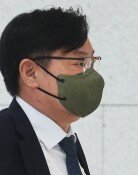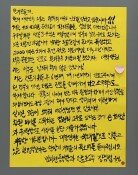NPAD can seize power only when oblivious of broadcasting
NPAD can seize power only when oblivious of broadcasting
Posted April. 17, 2014 04:49,
The main opposition New Politics Alliance for Democracy has its diehard disease coming back all over again. NPAD lawmakers with the Science, ICT, Future Planning, Broadcasting and Communications Committee are stubbornly boycotting deliberation of bills, claiming that they will handle other bills only after approval of a revision bill to the Broadcasting Act. As the ruling Saenuri Party rejects the demand, all the pending bills at the committee have been suspended.
The committee has 127 bills that both the ruling and main opposition parties already agreed upon. With the June 4 local elections approaching, the parties can garner more support from the public if they swiftly approve bills designed to improve peoples livelihoods. The NPAD already know that majority of voters are tired of "foot-dragging." However, the party has strong determination to protect the broadcasting bill no matter what even if it loses all other things.
Recently, the NPAD also responded sensitively to questions for job interviews at Korea Broadcasting System (KBS), the nations flagship state-run broadcaster. The partys lawmakers raised issue with interview questions, Do you think there are pro-North Korean people (in the South)? and Do you know how to sing Part Four of the Korean national anthem? The party claimed that it constitutes inspection of ideology to check interviewees ideological orientation, and demanded KBS to make a public apology. However, the partys blasting of the question on part four of the national anthem has caused the public to doubt the NPADs ideological identity. After all, the party ended up hearing derisive remarks from a KBS insider that it belongs to KBS own right to decide questions for new recruits.
When MBC appointed new executives in March, the Democratic Partys members harshly criticized the reshuffle, saying, It is like leaving the key of the bank safe to the bank robber. The Democratic Party, a predecessor of the NPAD, paid visits of endorsement whenever state-run broadcasters unions staged strike. It is apparently considering executives at broadcasters as "enemy," and the labor union as "ally." The NPAD raises voice that broadcasters should be politically independent, but it is none other than the party itself that seeks to interfere with broadcasting more than anyone else.
The issue of the Broadcasting Act is dispute over who within a broadcaster retains the right to organize and schedule programming. The current broadcasting act suggests broadcast programming as defining of the type, content, volume, visual images and arrangement of broadcasting contents. In short, it is a matter of determining what contents of programming to air. The NPAD proposes that the broadcasters` programming committee be composed of an equal number of members from labor and management. Currently, broadcast operators fix programming by referring to opinions from production staff. If the revision bill clears the National Assembly, the programming system will undergo a significant change in the relationship between management and labor: from hierarchical relationship to relationship of equals.
Private-sector broadcasters will resist the opposition party`s proposal, calling it infringement of managerial right, while it is also uncertain whether it is desirable for state-run broadcasters. Since the right-leaning presidents Lee Myung-bak and Park Geun-hye took power, labor unions at state-run broadcasters continue wielding immense influence. When a broadcaster seeks to air documentary programs on the late Presidents Lee Syng-man and Park Chung-hee, and General Baek Sun-yeop, the broadcaster had intense internal conflicts. On the other hand, a documentary on Jeong Yul-seong, who composed military songs for the North Korean Peoples Army and fought for the North as a Chinese solider, was aired on a state-run broadcaster without being checked. A broadcast programming committee comprised of an equal number of members from management and labor unions will give a giant boost to militant labor unions.
The Saenuri Partys secretary with the committee made a pitiful decision by consenting on such a bill that could be potentially unconstitutional. The Saenuri Party already approved the Newspaper Act in 2004, which was later found to be partially unconstitutional. Nevertheless, the NPAD argues that the Saenuri Party is solely responsible for the suspension of bills at the broadcasting and communications committee is an act, which disregards the public. It clearly reveals the partys plot to push for approval of the revision bill in order to increase the unions influence on broadcasters, and thereby create broadcasting environment in the partys favor.
The NPAD has often objected policies proposed by the rival party unconditionally. It even has tended to gain something in return by labeling policies as plots or conspiracy. The party has often given impressions of favoring the North Korean regime. If the main opposition party has a biased view of not being justly evaluated due to unfair broadcasting, it cannot achieve fundamental renovation and reform. The NPAD`s initiative to sway broadcasting during the era of post-democratization causes only negative images of the party.
The NPADs responses to broadcasting policy have repeatedly failed. During the Roh Moo-hyun administration, the then ruling partys bid to control broadcasting and left-leaning programming at state-run broadcasters earned public antipathy, causing the lowest ever approval rating of the administration. The partys defeat in the general elections and the presidential election in 2012, despite prevailing chances of winning, was partly attributable to the partys obsession, which was seen at boycott of general programming cable TV channels. No one else is to blame for the opposition partys current low approval rating. The sooner the NPAD becomes oblivious of broadcasting, the closer it will take power in the next presidential election.
Headline News
- Med professors announce intention to leave hospitals starting Thursday
- Bridge honoring Sgt. Moon Jae-sik unveiled in Pennsylvania
- Chief of Staff Chung tells presidential secretaries to stay away from politics
- US FTC bans noncompete agreements
- N. Korea launches cyberattacks on S. Korea's defense companies







